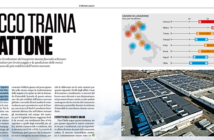A widespread need and desire, both from operators that end-users, to adopt an efficient and green logistics in the agro-food industry, is what emerged from the survey conducted by the World Capital in the latest edition of the Borsino, Real Estate Observatory of Logistics – the first half of 2013.
Dedicated to the theme of “sustainability of the agro-food chain”, today increasingly the subject of debate about modes of transport, construction technology and management of logistics space, environmental protection and economic organization of the industry, the Borsino has interwied logistical operators and end users directly involved to know their opinion and suggest possible strategies and policies usuful to improve the quality of agri-food delivery service. Among the respondents, Granarolo, Amadori, Fercam, Zani, Clo Logistics Services, Cuvin Agriculture, Brivio & Viganò, Apo Conerpo and Cuoreverde .
The market today demands increasingly adopting environmentally friendly and effective logistics solutions, and this meets the 100% of the willingness of the industry. Sustainability perceived as an opportunity, but especially as a primary need.
We asked our respondents what they believe is necessary to improve the agro-food logistics, and this is what emerged:
– in the general case, a good 40 % thinks appropriate the optimization of management of load and routes, 36% a greater share of vehicles and cargo return and the remaining 24% the increase in the proportion outsourcing;
– in the case of the last mile, 38% considers necessary the improvement the system of transport (vehicles less polluting, ICT on board), 33% the regularization of urban traffic (delivery schedules , parking, congestion charges) and the last 29% the use of specific local logistics platforms.
Developing a profitable and green logistics, therefore, would bring a significant added value to companies of production and processing and determine reduced costs of procurement of raw materials and acceleration of transportation time.
At the side however of the good intentions of the operators, the crux of the matter remains the distribution of costs resulting from the adoption of such systems: the buyers do not consider worthwhile to invest more than a certain threshold for such activities.
In fact, in the case in which the logistic operators have been asked to formulate proposals for services, the client was willing to pay up to 5% more for solutions “sustainable” than the standard solutions (with the same service quality and quantity) and only a percentage less than 30% of the buyers has expressly placed conditions/constraints related to the principles of sustainability.
… how to sensitize the final user, then?
For further information or to request report -> http://goo.gl/gTuwZ5




